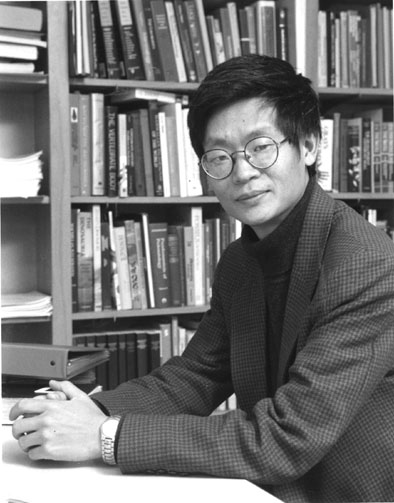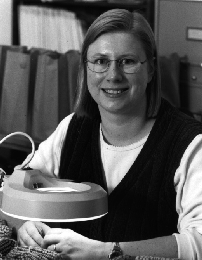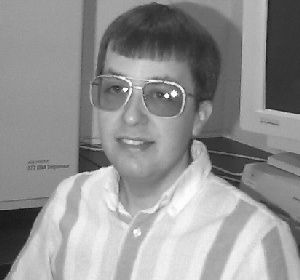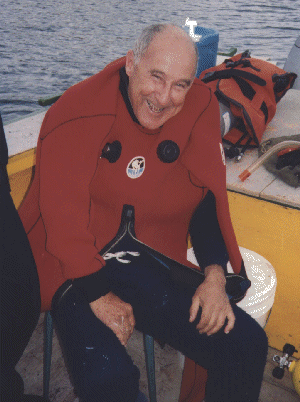New Faculty Profiles

In September 1996, the faculty welcomed Jin Meng
to the Biology Department. Dr. Meng received a Ph.D. from Columbia University
in 1991. Prior to his arrival at UMass, Amherst, Dr. Meng held
postdoctoral positions at the National Museum of Natural History in Washington,
D.C., the University of Alberta and the American Museum of Natural History
in New York.
Dr. Meng is a mammalogist who, by asking questions such
as "What modifications of the short, straight cochlea
of early mammals permitted the evolution of the coiled cochlea of living
mammals?" hopes to elucidate the transitional stages in the evolution of
the therian from the non-therian ear. He is also participating
in an NSF sponsored project designed to clarify the relationships between
the Rodentia (squirrels, beavers, rats, etc.) and the Lagomorpha (rabbits,
hares, etc.), and the affinities of the Lagomorpha to other orders of mammals.
It is hoped that this study will also shed light on the relationships within
the Rodentia which are, at the present time, poorly understood.

Elsbeth Walker assumed her duties in the Biology
Department in the spring of 1997. Dr. Walker received a Ph.D.
from Rockefeller University in 1990. For the next three years she was a
postdoctoral associate at Yale University and spent the following four
years at Mount Holyoke College, first as Visiting Assistant Professor and
then Principal Investigator.
Dr. Walker is a geneticist interested in the inheritance
of changes in gene expression in plants not occasioned by the alteration
of DNA base sequences; more specifically, she is focused on paramutation
in maize. Concomitantly, she is investigating a family of transposable
elements in maize that cause mutations in the gene complex governing aleurone
pigmentation.

As the 1998-99 academic year began, we were joined by
Dr. Ron Adkins. Dr. Adkins received his undergraduate degree from
Oklahoma State University and a Ph.D. in Genetics from Texas A & M
University. He was drawn to biology by his interest in nature, especially
mammals, and spent many years live-trapping and working with field
mice and rats, opossums, deer, gophers and armadillos.
Dr. Adkin's early interests were in ecology and evolution, and he has been involved in studies of nutrition, demography and hybridization. In graduate school, Dr. Adkin's interests shifted. He became interested in the manner in which the expression, function and sequences of molecules change over evolutionary time and how one can use such sequences to determine the relationships among organisms. At UMass, Dr. Adkins will be working on higher-level relationships among mammals; he will be trying to decipher how the growth hormone gene of higher primates became duplicated and how the sequences and the regulation of multiple copies of this gene have evolved.
Robert Wilce --
Honorary Doctor of Science

Professor Emeritus Robert Wilce has been awarded
an Honorary degree by the University of Copenhagen for his decades-long
work in the field of phycology. Starting in the 1950's, Bob made collections
in the Arctic and subarctic regions of Canada. The latter led to his paper
entitled
"The Marine Algae of the Labrador Peninsula and Newfoundland" which remains
a central work on the marine algae of this area. In 1990, Bob formulated
his biogeographic hypothesis on the role of the Polar Sea as a bridge between
the Pacific and Atlantic Oceans. This hypothesis has served as a stimulus
for the extensive studies currently going on at the University of Copenhagen,
some of which are already adding support to Bob's ideas.
Bob Wilce was one of the impelling forces behind the
establishment of the Northeast Algal Society, of which he was president
from 1982-1985. Although now an Emeritus Professor, his study and exploration
have not ceased. In 1994, at nearly 70 years of age, Bob returned to
northern Baffin Island to dive and collect algae. Many of our students
will remember Bob as an untiring collector, not only in the Arctic, but
along the Massachusetts coast as well. Throughout the years, Bob's lab was
populated by graduate and undergraduate students, many of whom made trips
to the Arctic with him, and collected along our coast at all seasons of
the year. When not collecting, Bob is continuing with his work on the phylogenetic
biogeography of the marine benthic flora of the North Atlantic.
|
Biology Alumni Newsletter Biology Department University of Massachusetts Amherst MA 01003-5810 |